Nursing pnn101 Study guides, Class notes & Summaries
Looking for the best study guides, study notes and summaries about Nursing pnn101? On this page you'll find 33 study documents about Nursing pnn101.
Page 2 out of 33 results
Sort by
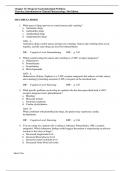
-
Chapter 13: Drugs for Gastrointestinal Problems Vislosky: Introduction to Clinical Pharmacology, 9th Edition
- Exam (elaborations) • 7 pages • 2023
-
- $13.99
- + learn more
Chapter 13: Drugs for Gastrointestinal Problems Visovsky: Introduction to Clinical Pharmacology, 9th Edition MULTIPLE CHOICE 1. What types of drugs prevent or control nausea and vomiting? a. Antiemetic drugs b. Antimotility drugs c. Antidiarrheal drugs d. Antipropulsion drugs ANS: A Antiemetic drug...
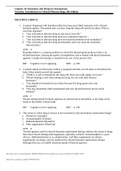
-
Chapter 16: Hormones and Drugs for Osteoporosis Vislosky: Introduction to Clinical Pharmacology, 9th Edition
- Exam (elaborations) • 9 pages • 2022
- Available in package deal
-
- $8.49
- + learn more
1. A patient diagnosed with hypothyroidism has been prescribed treatment with a thyroid hormone agonist. The patient asks you how long this drug will need to be taken. What is your best response? a. “You will need to take this drug for the rest of your life.” b. “You will need to take this drug until your symptoms improve.” c. “You will need to take this drug until your thyroid hormone level normalizes.” d. “You will need to take this drug incrementally until you reach the ma...
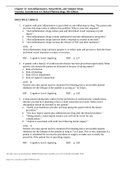
-
Chapter 12: Anti-inflammatory, Antiarthritis, and Antigout Drugs Visovsky: Introduction to Clinical Pharmacology, 9th Edition
- Exam (elaborations) • 9 pages • 2022
- Available in package deal
-
- $8.49
- + learn more
1. A patient with joint inflammation is prescribed an anti-inflammatory drug. The patient asks you how this drug works to address this problem. What is your best response? a. “Anti-inflammatory drugs reduce pain and limit blood vessel responses to joint injury.” b. “Anti-inflammatory drugs contain antibacterial and anti-inflammatory properties.” c. “Anti-inflammatory drugs limit the body’s response to cortisol in the body.” d. “Anti-inflammatory drugs increase the release o...
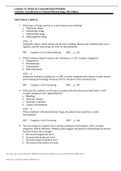
-
Chapter 13: Drugs for Gastrointestinal Problems Vislosky: Introduction to Clinical Pharmacology, 9th Edition
- Exam (elaborations) • 7 pages • 2022
- Available in package deal
-
- $10.49
- + learn more
Chapter 13: Drugs for Gastrointestinal Problems Visovsky: Introduction to Clinical Pharmacology, 9th Edition MULTIPLE CHOICE 1. What types of drugs prevent or control nausea and vomiting? a. Antiemetic drugs b. Antimotility drugs c. Antidiarrheal drugs d. Antipropulsion drugs ANS: A Antiemetic drugs control nausea and prevent vomiting. Nausea and vomiting often occur together, and the same drugs are used for both problems. DIF: Cognitive Level: Remembering REF: p. 242 2. Which common...
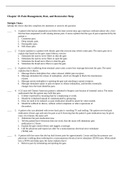
-
Chapter 19. Pain Management, Rest, and Restorative Sleep
- Exam (elaborations) • 15 pages • 2022
- Available in package deal
-
- $9.49
- + learn more
Identify the choice that best completes the statement or answers the question. ____ 1. A patient who had an amputation just below the knee several days ago expresses confusion about why a foot that has been amputated is still causing intense pain. A nurse explains that the type of pain experienced by the patient is 1. Cutaneous pain. 2. Deep somatic pain. 3. Neuropathic pain. 4. Soft-tissue pain. ____ 2. A nurse explains to a patient with chronic pain that exercise may relieve some pain....
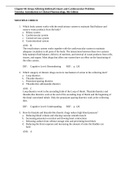
-
Chapter 08: Drugs Affecting theRenal/Urinary and Cardiovascular Problems Visovsky: Introduction to Clinical Pharmacology, 9th Edition
- Exam (elaborations) • 12 pages • 2022
- Available in package deal
-
- $9.49
- + learn more
1. Which body system works with the renal/urinary system to maintain fluid balance and remove waste products from the body? a. Biliary system b. Cardiovascular system c. Central nervous system d. Gastrointestinal system ANS: B The renal/urinary system works together with the cardiovascular system to maintain adequate circulation to all parts of the body. The interactions between these two systems help maintain fluid balance, delivery of nutrients, and removal of waste products from cell...
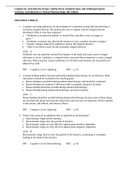
-
Chapter 05: Anti-infective Drugs: Antibacterial, Antitubercular, and Antifungal Agents Visovsky: Introduction to Clinical Pharmacology, 9th Edition
- Exam (elaborations) • 12 pages • 2022
-
- $7.49
- + learn more
1. A patient receiving antibiotics for the treatment of a bacterial wound infection develops a secondary fungal infection. The patient asks you to explain why the fungal infection developed. What is your best response? a. “Antibiotics can upset the balance of normal flora and allow yeast or fungus to grow.” b. “Antibiotic resistance has allowed the bacteria in your wound to become a fungus.” c. “Genetic changes induced by antibiotics lead to this fungal infection.” d. “There...
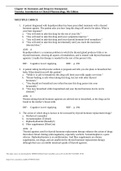
-
Chapter 16: Hormones and Drugs for Osteoporosis Visovsky: Introduction to Clinical Pharmacology, 9th Edition
- Exam (elaborations) • 9 pages • 2022
- Available in package deal
-
- $9.49
- + learn more
1. A patient diagnosed with hypothyroidism has been prescribed treatment with a thyroid hormone agonist. The patient asks you how long this drug will need to be taken. What is your best response? a. “You will need to take this drug for the rest of your life.” b. “You will need to take this drug until your symptoms improve.” c. “You will need to take this drug until your thyroid hormone level normalizes.” d. “You will need to take this drug incrementally until you reach the ma...
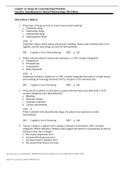
-
Chapter 13: Drugs for Gastrointestinal Problems Visovsky: Introduction to Clinical Pharmacology, 9th Edition question and answers
- Exam (elaborations) • 7 pages • 2022
-
- $8.49
- + learn more
1. What types of drugs prevent or control nausea and vomiting? a. Antiemetic drugs b. Antimotility drugs c. Antidiarrheal drugs d. Antipropulsion drugs ANS: A Antiemetic drugs control nausea and prevent vomiting. Nausea and vomiting often occur together, and the same drugs are used for both problems. DIF: Cognitive Level: Remembering REF: p. 242 2. Which common drug for nausea and vomiting is a 5-HT3 receptor antagonist? a. Ondansetron b. Promethazine c. Scopolamine d. Metoclopramid...
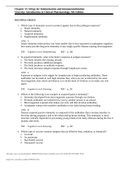
-
Chapter 15: Drugs for Immunization and Immunomodulation Visovsky: Introduction to Clinical Pharmacology, 9th Edition
- Exam (elaborations) • 6 pages • 2022
-
- $8.49
- + learn more
1. Which type of immunity serves to protect against day-to-day pathogen exposure? a. Innate immunity b. Natural immunity c. Acquired immunity d. Supplemental immunity ANS: A Innate immunity helps protect you from smaller day-to-day exposures to pathogenic organism but cannot provide long-term immunity to any single specific disease-causing microorganism. DIF: Cognitive Level: Remembering REF: p. 280 2. In acquired immunity, what is the body’s response to antigen exposure? a. The body...

$6.50 for your textbook summary multiplied by 100 fellow students... Do the math: that's a lot of money! Don't be a thief of your own wallet and start uploading yours now. Discover all about earning on Stuvia


